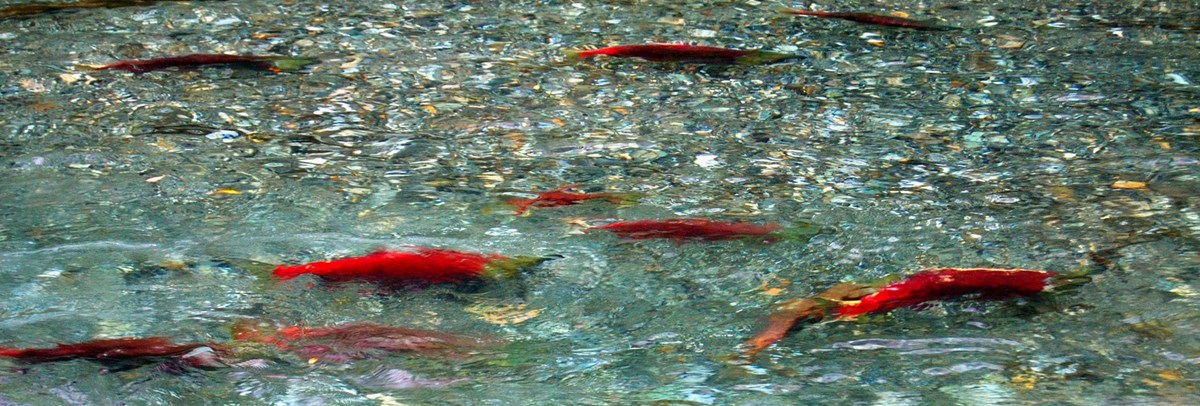Larairiss Festival: Wishes for Fishes
In the time before time, the hero known as Talorial came home from his adventures to find that his homeland had been stricken with a festering fog. All the crops were destroyed and all the people starving.The god of Allulina Bay is the great bottom dweller fish named Peimei. His people are the Lemi, a large, dull red fish that lives most of the time near the mouth of the estuary, but that once a year travels to the inland rivers to spawn. While spawning, lemi turn a brilliant crimson. They are a very popular food, but legend has it that this was not always so. Talorial is a famous legendary hero, appearing in many "time before time" stories. The Tale of the Great Fish explains how Talorial saved Peimei, and in return the god promised that his own people would sacrifice their flesh to ensure the survival of the Vessuna. The name of the holiday translates roughly as cycle of gratitude. It is both a thanks for the lives of the fish they have eaten and a request that the giving continue.
History
The festival has been celebrated in much the same form for at least three hundred years, but the size of the city has resulted in problems cropping up of late. The number of boats in the water means festival day brings many accidents, especially later in the day after revelers have been drinking four hours. Patrol fliers try to steer boats away from one another, but there are simply not enough of them to watch everywhere at once. In the past ten years, the city has begun a campaign for sobriety at the event, trying to create a more solemn air. This has been largely unsuccessful. Several churches have joined forces to create teams of volunteers to helm the boats in an effort to mitigate casualties, though this does nothing to prevent the number of drunken folk who go overboard.
The other large issue is less talked about, though potentially more disastrous. The numbers of lemi have been slowly but steadily decreasing. Some believe that Peimei is angry with Samavrana for their misuse of the bay and the gift of the fishes' sacrifice and is holding back his people. Some point out that not enough fish are making it to the breeding grounds. Others argue that these are not mutually exclusive. Whatever the reason, so far no solution has been adopted; the lemi is too big a part of the Samavran diet for the answer to be an easy one. Though if they continue to ignore it, perhaps Peimei will solve the issue for them.
Execution
Brothers of the Bay, children of the Giver, accept this offering. As you feed us, so do we feed you.On the morning of the Summer Solstice hundreds of boats, ranging from tiny fisher's rowboats to enormous pleasure noble pleasure barges, leave the docks of Samavra and head out towards the mouth of the Allulina, carrying with them a festive air and most of the city's Vessuna. Competition for "good spots" can be fierce, and many arise before dawn or even take their boats out the night before to secure their favorite. The early phases of the celebration are similar for most participants. Some prayers are said followed by hymns of thanksgiving. During the latter, celebrants pass around a stack of fragile, translucent paper sheets made from a particular species of kelp (something like rice paper, but with a pale green tint). It is traditional to take one at this point, though the papers remain available throughout the celebration. Each reveler writes a wish on their sheet using a deep brown ink harvested from a common gastropod. The wishes are then rolled up, tied with a strand of kelp, and thrown into the water. Though other fish also consume these offerings, they are intended for the lemi residing on the floor of the bay. It is believed that the fish pass the wishes of Samavra on to the Great Fish. Once that ritual is complete, the rest of the day is given over to eating and drinking. Many customarily exchange small gifts. (Large presents are considered rude attempts to overshadow the greatest gift: the self-sacrifice of the lemi.)
Components and tools
Participants
Smaller communities of Vessuna around the bay effectively shut down for this celebration. It is a day off for all. Every Samavran Vessun who can spends at least part of the day on the water, but the larger celebration comes at the expense of the borrowers and other species who are pressed to make sure that the city keeps running. Though some do celebrate, many don't have the luxury of taking an entire day off.
Special services are held the day after at Peimei's temples, but attendance is thin. Most of the revelers are not primarily faithful of the Great Fish, and they're all sleeping it off anyway. Only the most dogged worshipers get themselves up for the more formal ceremony offered by the priests.
Observance
Summer Solstice
Primary Related Location




Comments